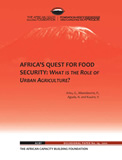
The history of urban agriculture in Africa dates to the colonial era when farming flourished in urban areas, largely to meet consumption needs of bureaucrats, settlers, and other elites. Today, urban agriculture is becoming increasingly significant as a source of household food, a trend that is closely linked to declining incomes of vulnerable urban households in the wake of neoliberal economic restructuring, high rates of urbanisation, and the need to serve an emerging niche market in African cities. Urban agriculture is generally viewed as a potentially viable policy response to the complex challenge of feeding a burgeoning mass of urban residents amidst decline in food production in rural areas. Also, recent concern regarding climate change and the need to reduce the environmental footprint that comes from transporting food over long distances has given impetus to the need for urban agriculture. The aforementioned notwithstanding, the balance of evidence from existing literature on urban agriculture indicates that the practice faces varying degrees of opposition from urban authorities and policy-makers, who generally underestimate its actual value and contribution to urban povertyandfood insecurity. The apparent lack of political will necessary to promote African urban agriculture over the years is reflected in weak or absent policy frameworks over the years, resulting in an enormous capacity deficit. Policy makers and planners need systematic information for planning and managing capacity development centered on urban agriculture. Such a focus on urban agriculture will unlock its potential to address the growing urbandemandfor foodandto alleviate urban poverty.





